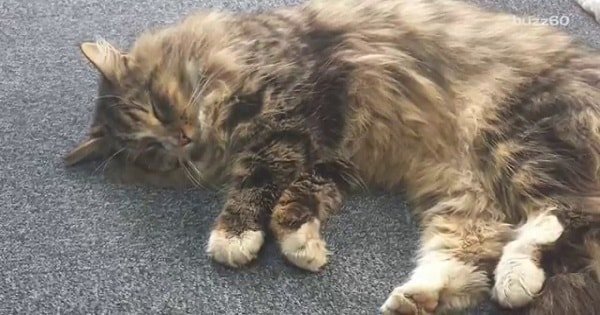Starting around the age of ten years old, all cats begin to show signs of old age – whether it be his sight weakening, his sense of smell not being so sharp anymore or his hearing deteriorating. At this certain age, cats tend to sleep much more, search for heat and either lose or pick up weight rapidly. Their behavior becomes a lot less energetic and more relaxed.
If you have a senior kitty in your home, you may be unaware of the specific needs they have or how their needs evolve with age. Be sure to read all of the following tips, which are offered by the French animal protection association, 30 Millions d’Amis, so that you can take good enough care of him so that he can live for another five or ten years, and let him live out his old age in peace.
1. Make your cat’s environment comfortable!
Old age comes with pain oftentimes and discomfort, so try to change your home around so that your kitty can live normally. Put some baskets down, soft blankets and pillows, and install steps so that he doesn’t have to jump so high anymore.
2. Accommodate your furry’s arthritis!
If your cat begins suffering from arthritis, which tends to come with old age, consider investing in a memory foam pillow, which is great and very comfortable to sleep on.
3. Keep him warm always!
The older a cat gets, the much more easily he feels cold. You should avoid leaving doors and windows open near him when he’s sleeping, and move his bed around to follow the sun during the day.
4. Keep playing with your baby!
An older cat still needs a reasonable amount of exercise, so play with him in moderate amounts. And of course, don’t stop giving him cuddles and affection!
5. Adapt your cat’s food!
Older kitties have different dietary needs to kittens. A ‘wetter’ food is much easier for older cats to digest, so a good idea is to wet his senior-variety pellets before serving them.
6. Groom your cat regularly!
Old cats often lose their fur in batches, and it’s important to groom him often. As he gets older, your kitty will not be able to bathe himself as thoroughly as he used to because he will become less flexible, so he needs you to keep his skin, fur and hygiene intact.
7. Arrange regular vet check-ups!
A senior cat needs to see the vet more frequently than a healthy, young kitten. Yearly check-ups at the veterinarian will allow for blood and urine tests which will determine your kitty’s health and keep you updated.
Always be sure to take care of your senior cat’s needs and he will continue to love you and give the best cuddles in his way of saying thank you!
H/t: 30 Millions d’Amis / Other images: Just Us Old Cats/Instagram





